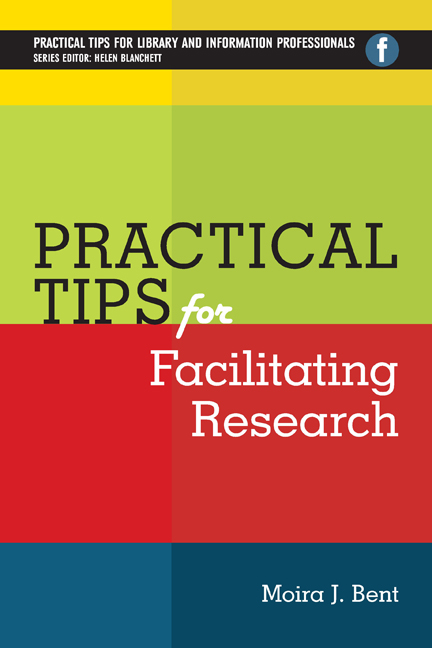Book contents
- Frontmatter
- Contents
- List of figures
- Series Editor's introduction
- Acknowledgements
- 1 Introduction
- 2 Section summaries
- 3 Landscapes and models
- 4 Structures and strategies
- 5 Places and spaces
- 6 Library staff roles
- 7 Collections
- 8 Specific interventions in the research process or lifecycle
- 9 Teaching approaches
- 10 Information literacy skills workshops and programmes
- 11 Bibliography
- Index
8 - Specific interventions in the research process or lifecycle
Published online by Cambridge University Press: 08 June 2018
- Frontmatter
- Contents
- List of figures
- Series Editor's introduction
- Acknowledgements
- 1 Introduction
- 2 Section summaries
- 3 Landscapes and models
- 4 Structures and strategies
- 5 Places and spaces
- 6 Library staff roles
- 7 Collections
- 8 Specific interventions in the research process or lifecycle
- 9 Teaching approaches
- 10 Information literacy skills workshops and programmes
- 11 Bibliography
- Index
Summary
Identifying opportunities in research workflows (see also Tip 3.6)
TO ENGAGE EFFECTIVELYwith researchers we need to understand who they are and what they do and, particularly, when they are doing it and what their issues and concerns are. By getting involved at all stages of the research workflow and looking for opportunities to participate, we will be better able to demonstrate value.
In A Slice of Research Life Kroll and Forsman (2010) surveyed researchers in four universities in the USA and concluded that there are eight topics with associated tasks which would benefit from the use of information within the research lifecycle:
Learning about grant funding opportunities. The library may have a role in co-ordinating information from different sources and publicizing it to researchers.
Issues surrounding intellectual property and exploiting commercial value. This need varies between disciplines but a role for the library might be identified with respect to copyright, licensing and referral.
Finding potential collaborators, whether multi- or cross-disciplinary or even cross-organization. It's certainly true that in the sciences there are fewer individual researchers and many more working in teams.
Management and storage of documents and datasets. The rapid developments in technology make it more difficult to retrieve older material, with researchers expressing concern for the safety of work recorded on already outdated media or using obsolete software. Cloud services can help but this still requires the development of metadata to organize the materials.
Analysing text and datasets.
Improving information retrieval and management skills. This is often low on a researcher's priorities. Researchers live by ‘satisficing’ and will often use tools and services which are fast and easy if not optimal.
Citing references, using bibliographical management tools.
Choosing where to publish, understanding the difference between preand post-prints in making work open access.
These topics and tasks can be a useful starting point to better understand research workflow processes and hence when to devise lifecycle interventions.
- Type
- Chapter
- Information
- Practical Tips for Facilitating Research , pp. 119 - 180Publisher: FacetPrint publication year: 2016



